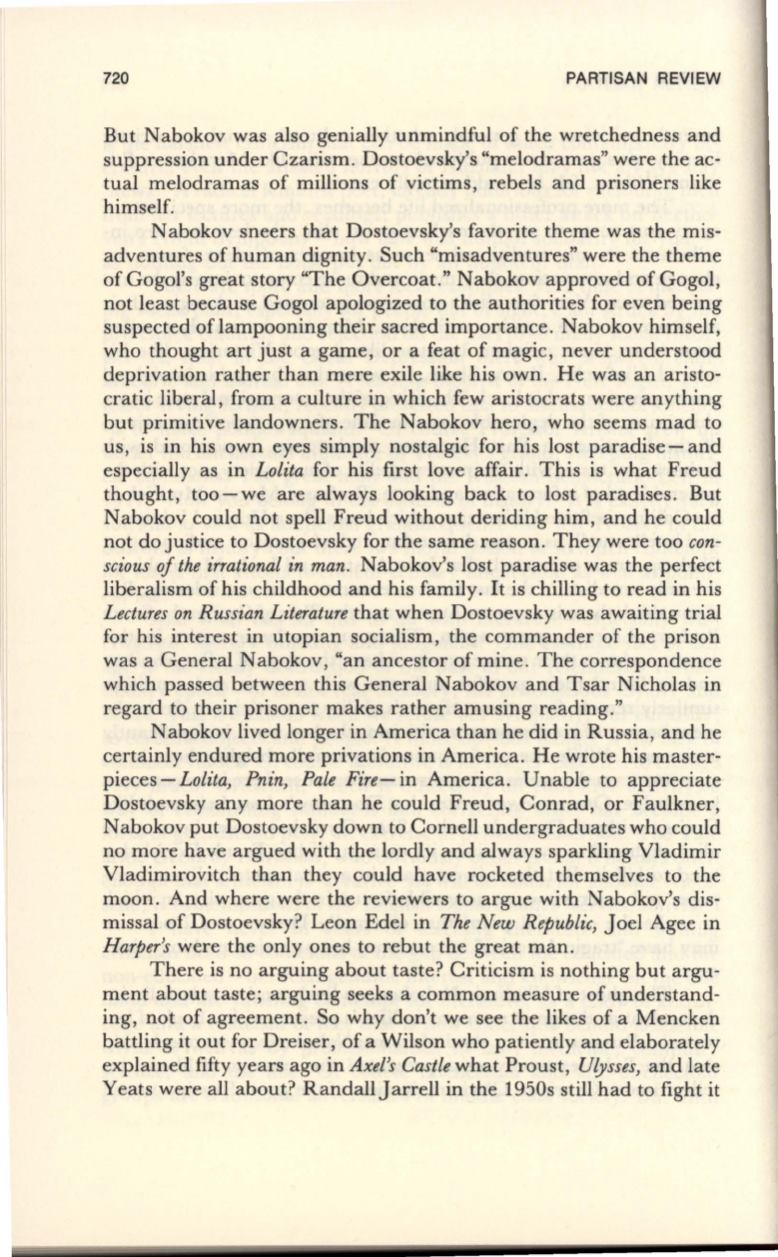
720
PARTISAN REVIEW
But Nabokov was also genially unmindful of the wretchedness and
suppression under Czarism. Dostoevsky's "melodramas" were the ac–
tual melodramas of millions of victims, rebels and prisoners like
himself.
Nabokov sneers that Dostoevsky's favorite theme was the mis–
adventures of human dignity. Such "misadventures" were the theme
of Gogol's great story "The Overcoat." Nabokov approved of Gogol,
not least because Gogol apologized to the authorities for even being
suspected of lampooning their sacred importance. Nabokov himself,
who thought art just a game, or a feat of magic, never understood
deprivation rather than mere exile like his own . He was an aristo–
cratic liberal, from a culture in which few aristocrats were anything
but primitive landowners. The Nabokov hero, who seems mad to
us, is in his own eyes simply nostalgic for his lost paradise- and
especially as in
Lolita
for his first love affair. This is what Freud
thought, too-we are always looking back to lost paradises. But
Nabokov could not spell Freud without deriding him, and he could
not do justice to Dostoevsky for the same reason. They were too
con–
scious of the irrational in man.
Nabokov's lost paradise was the perfect
liberalism of his childhood and his family. It is chilling to read in his
Lectures on Russian Literature
that when Dostoevsky was awaiting trial
for his interest in utopian socialism, the commander of the prison
was a General Nabokov, "an ancestor of mine. The correspondence
which passed between this General Nabokov and Tsar Nicholas in
regard to their prisoner makes rather amusing reading."
Nabokov lived longer in America than he did in Russia, and he
certainly endured more privations in America. He wrote his master–
pieces-
Lolita, Pnin, Pale Fire-
in America. Unable to appreciate
Dostoevsky any more than he could Freud, Conrad, or Faulkner,
Nabokov put Dostoevsky down to Cornell undergraduates who could
no more have argued with the lordly and always sparkling Vladimir
Vladimirovitch than they could have rocketed themselves to the
moon. And where were the reviewers to argue with Nabokov's dis–
missal of Dostoevsky? Leon Edel in
The New Republic,
Joel Agee in
Harper's
were the only ones to rebut the great man.
There is no arguing about taste? Criticism is nothing but argu–
ment about taste; arguing seeks a common measure of understand–
ing, not of agreement. So why don't we see the likes of a Mencken
battling it out for Dreiser, of a Wilson who patiently and elaborately
explained fifty years ago in
Axel's Castle
what Proust,
Ulysses,
and late
Yeats were all about? Randall Jarrell in the 1950s still had to fight it


